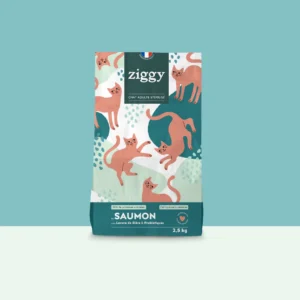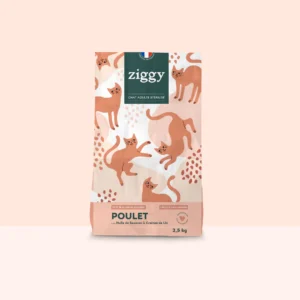Croquettes Maine Coon Stérilisé Sans Céréales Poulet (Maine Coon, Sterilized, Grain-Free, Chicken)
Croquettes Maine Coon Stérilisé Sans Céréales Poulet (Maine Coon, Sterilized, Grain-Free, Chicken)
Product Summary
Ziggy Croquettes Maine Coon Stérilisé is a grain-free, high-protein formula designed to meet the specific nutritional needs of sterilized Maine Coon cats.
It features 26% fresh chicken, 20% dehydrated pork protein, and 11% dehydrated chicken protein to support muscle mass and maintain overall health.
Its optimal protein-calorie ratio (116 g protein/McalEM) and moderate fat content (13.5%) help sterilized cats maintain ideal body weight and energy levels.
Omega-3 (1.37%) and omega-6 (2.75%) fatty acids from salmon, sunflower, and flaxseed promote healthy skin and a shiny coat.
The formula includes plant fiber, yucca schidigera, and Enterococcus faecium to support digestion, reduce stool odor, and improve gut health.
It is fortified with essential vitamins and minerals, taurine (2,000 mg), and L-carnitine (600 mg), which support heart health, vision, metabolism, and overall well-being.
Low carbohydrate content (24.2%) ensures a balanced diet, suitable for Maine Coons with lower carbohydrate tolerance.
Pros:
- High protein content: 44% crude protein ensures muscle maintenance and supports the unique needs of large, muscular breeds like Maine Coons.
- Balanced fatty acids: These include omega-3 and omega-6 fatty acids, which improve coat condition and support a healthy inflammatory response.
- Digestive support: Contains yucca schidigera, plant fiber, and Enterococcus faecium to promote gut health and reduce stool odor.
- Weight management: Moderate fat (13.5%) and L-carnitine inclusion help maintain optimal weight in sterilized cats.
- Comprehensive micronutrient profile: Fortified with vitamins (e.g., A, D3, E), taurine, and minerals to support immune, heart, and vision health.
Cons:
- Moderate phosphorus content: At 0.77%, phosphorus levels may require monitoring for cats prone to kidney issues.
- Complex ingredient profile: Multiple protein and carbohydrate sources may not suit cats with specific food sensitivities or allergies.
- Low moisture content: At only 6%, cats with low water intake or urinary concerns may need additional hydration.
- High fiber content: With 5.8% crude fiber, it may not be suitable for cats with lower dietary fiber requirements or sensitive digestion.
Ingredients
Vitamins and Additives
Notes
The score is calculated after relocation of fresh meat or fish ingredient(s) as explained in the calculation rule #7 in Chapter 1.
Guaranteed Analysis
Notes
The score is calculated after relocation of fresh meat or fish ingredient(s) as explained in the calculation rule #7 in Chapter 1.




